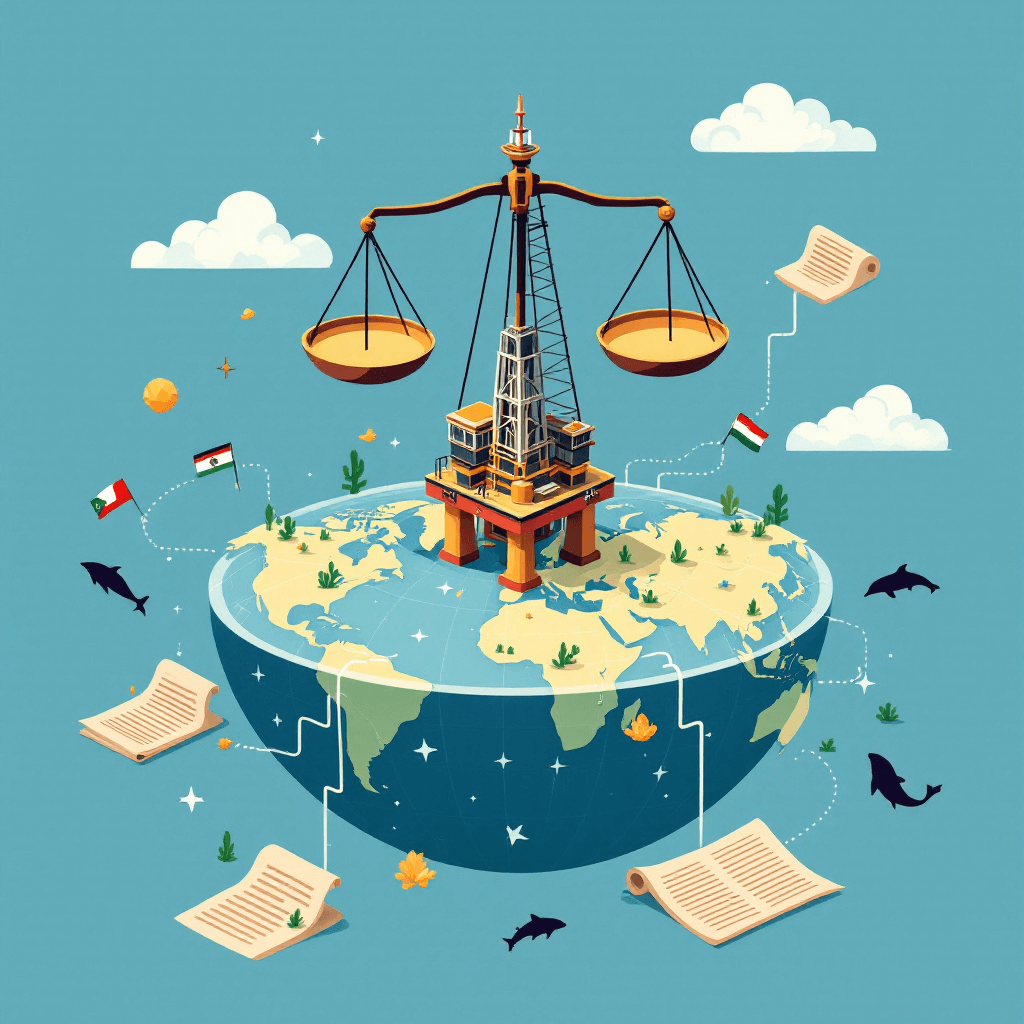
Oil exploration is a global enterprise that transcends national boundaries, involving complex operations in diverse environments—from deep-sea beds to arctic regions. As the demand for energy continues to rise, so does the importance of regulating oil exploration activities to ensure they are conducted responsibly, sustainably, and within the bounds of international law. This article outlines the key international legal frameworks that govern oil exploration, shedding light on the laws and agreements that regulate this critical industry.
Oil remains one of the world’s most vital energy sources, powering industries, transportation, and households worldwide. The exploration and extraction of oil are activities that have significant economic benefits but also pose environmental risks and geopolitical challenges. Therefore, a robust international legal framework is essential to manage these activities effectively. These laws and agreements are designed to balance the interests of different nations, protect the environment, ensure safety, and promote fair economic practices.
The United Nations Convention on the Law of the Sea (UNCLOS) is often referred to as the “constitution of the oceans.” Adopted in 1982, UNCLOS provides a comprehensive legal framework governing the rights and responsibilities of nations concerning the use of the world’s oceans. It covers various aspects, including navigational rights, territorial waters, exclusive economic zones (EEZs), continental shelves, and the exploitation of marine resources.
UNCLOS is particularly significant for oil exploration as it defines the rights of coastal states over natural resources in different maritime zones:
These provisions allow countries to claim rights over offshore oil reserves and regulate exploration activities within these zones.
UNCLOS also establishes mechanisms for dispute resolution, which are crucial when conflicts arise over maritime boundaries or resource exploitation rights. The International Tribunal for the Law of the Sea (ITLOS) adjudicates disputes, ensuring that conflicts are resolved peacefully and according to international law.
The International Maritime Organization (IMO) is a specialized agency of the United Nations responsible for regulating shipping. While the IMO’s primary focus is on maritime safety and preventing pollution from ships, several of its conventions impact oil exploration activities, particularly offshore drilling.
These conventions collectively ensure that oil exploration and extraction activities adhere to international safety and environmental protection standards.
The Paris Agreement, adopted in 2015 under the United Nations Framework Convention on Climate Change (UNFCCC), is a landmark global accord aiming to limit global warming to well below 2 degrees Celsius above pre-industrial levels.
While the Paris Agreement does not directly regulate oil exploration, it has significant indirect effects:
The Paris Agreement encourages nations to balance economic development with environmental stewardship, affecting long-term strategies in the oil and gas sector.
The Organization of the Petroleum Exporting Countries (OPEC) is an intergovernmental organization of oil-producing nations that coordinates and unifies petroleum policies among member countries.
While OPEC does not directly create legal frameworks, it significantly influences the global oil market by:
OPEC’s decisions can indirectly shape international norms and expectations regarding oil exploration and production.
The International Labour Organization (ILO) establishes international labor standards, including those relevant to workers in the oil and gas industry.
Ensuring compliance with ILO conventions helps protect the rights and safety of workers involved in oil exploration activities.
The Convention on Biological Diversity aims to conserve biological diversity, promote sustainable use, and ensure fair sharing of genetic resources.
Protects wetlands of international importance, which may affect onshore and near-shore exploration projects.
With the melting of polar ice opening new exploration opportunities, the Arctic Council plays a pivotal role in regulating activities in the Arctic region.
The European Union (EU) has stringent regulations for member states, including directives on offshore safety and environmental protection.
Countries often enter into bilateral or multilateral treaties to manage cross-border oil reserves and joint exploration projects.
These agreements facilitate collaboration and prevent conflicts between nations over resource exploitation.
Disputes over maritime boundaries and resource rights remain challenging. Ongoing negotiations and legal adjudications aim to resolve these issues peacefully.
The growing emphasis on environmental protection and sustainable development influences international legal frameworks. Future regulations may become stricter to mitigate climate change impacts.
Advancements in exploration technology, such as deep-water drilling and hydrofracking, present new regulatory challenges that international laws must address.
The international legal frameworks governing oil exploration are multifaceted, involving a combination of global conventions, regional agreements, and bilateral treaties. These laws aim to regulate the exploration and extraction of oil to promote peaceful cooperation between nations, protect the environment, ensure the safety of workers, and balance economic interests with global sustainability goals.
As the geopolitical landscape evolves and environmental concerns become more pressing, the legal frameworks will continue to adapt. Stakeholders in the oil and gas industry must stay informed about these developments to navigate the complex legal environment effectively.
Staying abreast of these legal frameworks is essential for any entity involved in oil exploration to operate legally, ethically, and sustainably on the international stage.
By understanding and complying with these international legal frameworks, stakeholders can contribute to responsible oil exploration that meets global energy needs while safeguarding environmental and social interests.